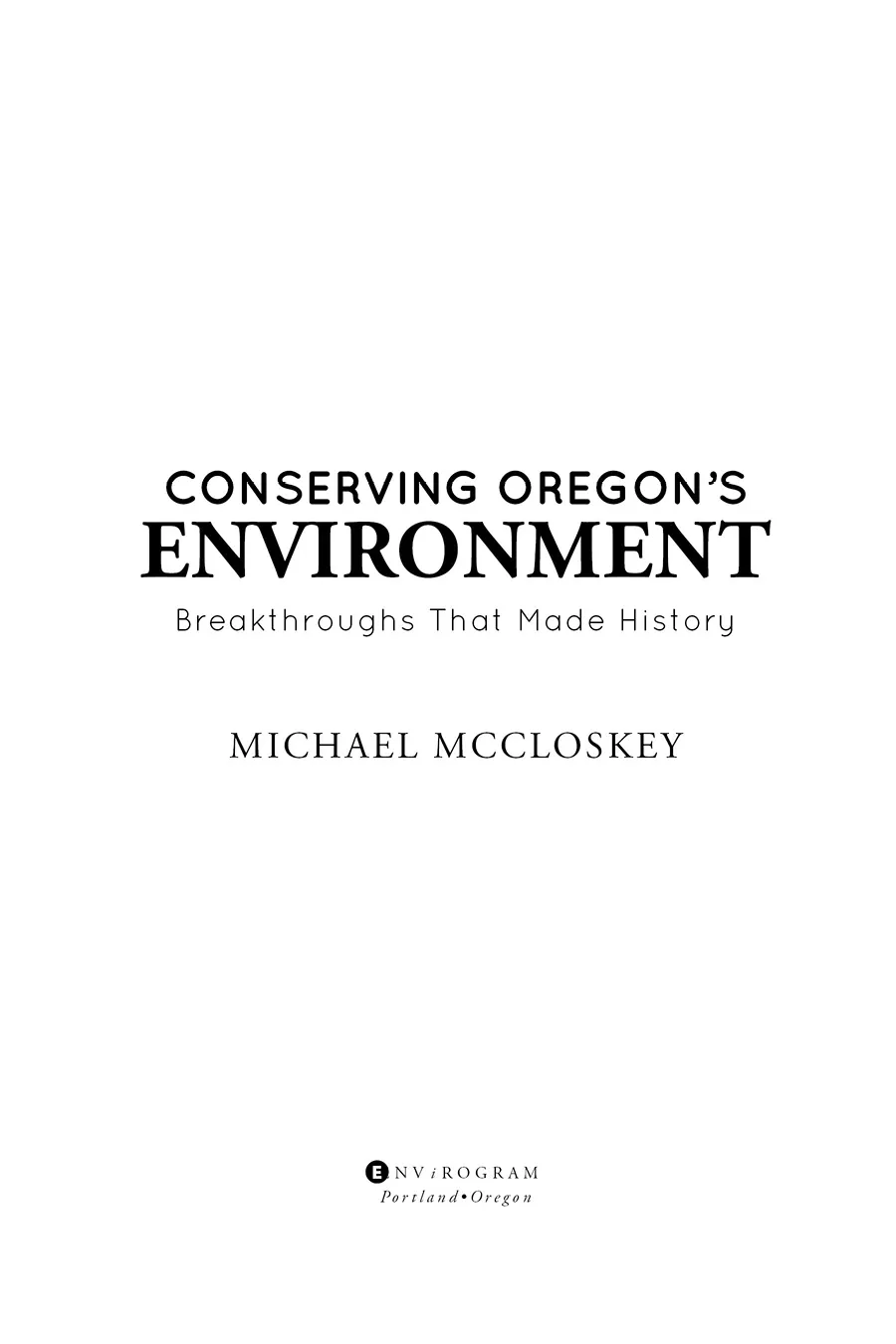Contents
Acknowledgments
Introduction
The Foundational Federal Reserves
The State and Others Do Their Part
The Fate of
Oregon’s Rivers
Wilderness Issues in the National Forests
Oregon’s Environmental Laws: Key Programs
Environmental
Turning Points
The Advent of
New Reserves
Protecting Wildlife: Refuges and Programs
Breakthroughs on the National Forests
Important
Federal Initiatives Affecting Oregon
Conclusions
About the Author
Copyright
Praise for Conserving Oregon’s Environment
“Drawing upon his experience in preserving wilderness areas in Oregon and leading the Sierra Club as Executive Director, Mike McCloskey has the credentials to write this book…in fact, he is the ideal person to write it. Every Oregon conservationist will want to read it.”
– Greg Jacob, Professor, Portland State University
“Oregon has long been a leader in the modern environmental movement. McCloskey tells a fascinating story that is little known beyond the state’s borders. A great read about an important time in the fight to preserve our environment.”
– Larry Williams, Co-Founder and first Exec. Director, Oregon Environmental Council
“For the first time, Mike McCloskey has brought together a collection of stories about how Oregonians have long fought to protect the places and values they cherish. If you have always wondered about how so many of Oregon’s forests, beaches, and other natural resources were protected, then this is the book for you. It is an invaluable resource for all those who want to understand the background story of those who cared enough to right for Oregon’s great natural legacy.”
–Ronald Eber, Historian, Oregon Chapter, Sierra Club
“Mike McCloskey was an active participant in parts of the environmental history that he recounts in this remarkable book. He brings the eye of an astute observer to events that not only were the key to shaping the modern Northwest but that helped form a rising environmental consciousness in our nation. Nobody has pulled most of these stories together in one place before—and nobody has recounted any of them with as much verve and insight as McCloskey.”
–John Bonine, Professor of Law, University of Oregon
Acknowledgments
Various people helped me research the stories recounted in this book. Some, such as Don Waggoner, granted me very helpful interviews. Others, such as Larry Williams, Andy Kerr, Brock Evans, Ron Eber, Sydney Herbert, Griffin Hampson, and Ivan Maluski, told me stories that I incorporated. Some, such as Sallie Gentry, pointed me in the right direction. Others, such as Kay Knack, helped me dig out stories. And for my coverage of Nestucca Spit and the coast, I drew heavily on a draft article written by Catherine Williams.
Others, such as Arnold Cogan and Carolyn Gassaway, reviewed sections. Larry Williams and Ron Eber offered invaluable comments on the entire text. Chris Williams provided indispensable computer assistance.
And I am indebted to Jim McMullen for managing the process of acquiring, taking, and arranging the photographs to illustrate this book.
I thank them all. They made this book possible.
Michael McCloskey
Introduction
Some years ago I looked into the visitor center for the Redwood National Park. Early in my career with the Sierra Club, I had been their chief lobbyist for the establishment of that park. I was curious about how the Park Service was going to tell the story of that park. To my amazement, I found almost nothing said about how that national park came to be. It was almost as if it were the offspring of a “virgin birth.” It had no father.
I knew that this park had come out of a wrenching struggle that drew national coverage. The affected lumber companies fought every inch of the way against the environmentalists, yet now it would seem that this was simply the product of an enlightened government. I then wondered whether the park’s establishment was too “hot” a subject for the Park Service to touch.
But as I then looked around the country in the visitor centers for other national parks, I learned that this silence was the rule. Those who had worked their hearts out to bring about these achievements were rarely even acknowledged, let alone thanked. Fortunately, Crater Lake National Park is something of an exception, with the pivotal role of William Gladstone Steel showcased.
For a while I had hoped that those in academia who specialize in environmental history might redress the balance. I had read some excellent books by some of them that told the stories of how such laws as the Wilderness Act had come about. But as I explored further, I learned to my dismay that few of them were focused anymore on public programs. Many of them had shifted their focus from “political history” to what they termed “cultural history” instead. Now they were delving into issues of race, gender, and class. While once these issues had been neglected, they now were their main focus, and public programs were being neglected. Some of them were going even further and viewing those who made their livelihoods exploiting natural resources as the victims. Thus, these academics no longer were inclined to view environmentalists as the “white hats.”
With Oregon now being widely acknowledged as the leading environmental state, I knew that I had missed a lot. When I retired and returned to the state, I thought that I could catch up on things by merely reading a book on the topic. Sinc...

